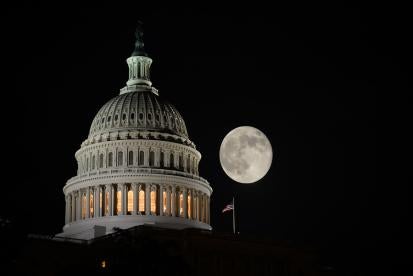On December 21, 2020, Congress passed a massive bill (H.R. 133) that would fund the federal government for the remainder of fiscal year (FY) 2021 while also providing $900 billion in COVID-19 economic relief for employers and individuals. President Trump signed the bill into law on December 27, 2020. Coming in at a total cost of $2.3 trillion and a page count approaching 6,000, in some ways it is easier to explain what is not in the bill, rather than what is covered by the bill. Nevertheless, below are some of the key provisions of the legislation of importance to employers.
Employer Liability Protections and Local Government Aid Nixed
Since the passage of the Coronavirus Aid, Relief, and Economic Security (CARES) Act in March 2020, Republicans have sought to protect employers that follow official government health protocols from COVID-19–related lawsuits and enforcement actions. Democrats opposed these efforts as unfair to workers and consumers. At the same time, Democrats pushed for economic aid for state and local governments, but this was opposed by Republicans who were wary of potentially bailing out local governments from non-COVID-19–related issues. These two major sticking points—employer liability reforms and state/local government aid—were left out of the legislation.
What About FFCRA Leave?
The emergency paid family leave and sick leave provisions of the Families First Coronavirus Response Act (FFCRA) expire on December 31, 2020. The stimulus package would not extend or expand these requirements for covered employers. However, the FFCRA’s refundable tax credits would be extended and available to covered employers that choose to continue to provide paid family and sick leave.
Unemployment Insurance
The legislation extends CARES Act unemployment programs as follows:
-
The Federal Pandemic Unemployment Compensation (FPUC) program supplement will be extended from December 26, 2020 to March 14, 2021, but will be lowered from $600 to $300 per week.
-
The Pandemic Unemployment Assistance (PUA) program for workers who are not traditionally eligible for unemployment insurance (such as independent contractors), will be extended to March 14, 2021, with a three-week phaseout to April 5, 2021. Additionally, the legislation increases the number of weeks employees are eligible for PUA benefits from 39 to 50.
-
The Pandemic Emergency Unemployment Compensation (PEUC) program, which provides additional weeks of unemployment insurance benefits to individuals who exhaust their state unemployment benefits, is extended through March 14, 2021, but has a three-week phaseout to April 5, 2020. Additionally, the number of PEUC weeks is increased from 13 to 24.
Federal Contractor Relief
The legislation extends the expiration date for CARES Act Section 3610 through March 31, 2020, to reimburse federal contractors for paid leave that they provide to certain employees or subcontractors who are unable to work as a result of the COVID-19 crisis and who also cannot telework because their job duties cannot be performed remotely.
Tax Matters
-
The bill provides a refundable tax credit of $600 per individual ($1,200 for married filing jointly), as well as $600 per child under the age of 17. The credit phases out starting at $75,000 of adjusted gross income ($150,000 for married filing jointly).
-
The bill extends the repayment period of deferred payroll taxes through December 31, 2021. Penalties and interest begin to accrue beginning January 1, 2022.
-
The bill extend the CARES Act’s employee retention tax credit.
Other Stimulus Funding
The bill also:
-
provides over $284 billion for the small business Paycheck Protection Program (PPP) to allow for a second round of loan payments;
-
allocates over $50 billion to purchase and distribute vaccines, and assist states with testing and contact tracing;
-
allocates $82 billion in funds for schools; and
-
allocates $45 billion for transportation infrastructure, such as funds for airlines, airports, and mass transit.




 />i
/>i

